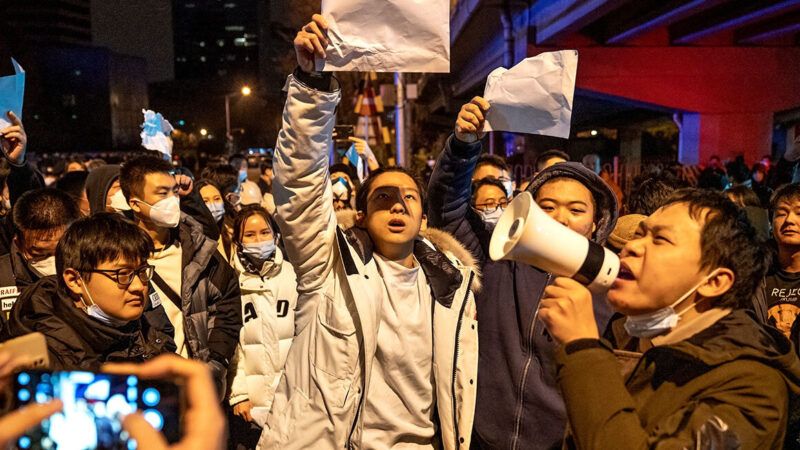Chinese Protesters Use Their Bodies as Weapons Against the State
Standing with blank pages in hand, the protesters' goal is to make manifest the implied violence that authoritarian states use to keep order.

In China, crowds of people line the streets. They are holding blank sheets of paper. There's nothing special about the paper; it's ordinary A4 letter size. The police nonetheless know what they mean. The leaders of the Chinese Communist Party know what they mean. The world knows what they mean.
By standing with empty pages in hand, the protesters' goal is to make manifest the implied violence that authoritarian states use to keep order. If you want control over me, they silently declare, you must violently take my body away, for the world to see, even though I have done nothing more than exist.
There's an old Soviet joke about this. A man in a train station hands out leaflets to passersby. When the KGB arrests him, it discovers that the leaflets are blank pieces of paper.
"What's the meaning of this?" its agents demand.
"Everyone knows what the problem is," he says, "so why bother writing it down?"
Everyone does know the problem. The state has taken too much.
In November in China, the immediate impetus for the protests was extreme COVID-19 lockdowns, which prevented people from conducting the basic business of life. The draconian, abrupt, and arbitrary restrictions led to the lonely, unnecessary deaths of the trapped, the sick, the starved, including 10 people who were killed in a fire in Ürümqi, Xinjiang, on November 24.
China does not have a monopoly on intolerable state repression, nor are its people alone in taking refuge in wordless protest. In Tehran, women stood in the street and put up their ponytails in defiance of the morality police, whom they held responsible for the September death of Mahsa Amini, a 22-year-old woman arrested, beaten, and killed for not wearing her hijab correctly. In Qatar, their brothers on the national soccer team stood silent as their own anthem played at the World Cup. In Russia, as tensions mount over the invasion of Ukraine and the resulting draft and censorship, the old joke has become a reality: A recent video shows a woman with a blank poster board being hauled out of Red Square.
Each of these regimes has long taught its people what happens when they object to forced labor, incarceration, censorship, threats, and other controls on their lives. It's a lesson they admirably refuse to learn.
In college, circa 1999, a group of my friends thought it would be cute to circulate a meaningless petition—something impenetrable about Being and being from Heidegger, if I recall correctly—to see how many students would blindly sign. We marched with blank placards, shouting slogans like "We demand an end to demands" and "What do we want? Nothing! When do we want it? Whenever." To us, it was the end of history, and wannabe campus radicals deserved mockery. It was more performance art than activism—and not very good performance art at that.
Seeing dissidents in China do in deadly earnest what I playacted as a stupid teenager drives home the yawning gap between our countries, and how wrong I was about the pointlessness of symbolic protest. In the U.S., our protests are mostly straightforward and noisy, though the state still takes and breaks the bodies of too many, a point made loud and clear in 2020 after the deaths of George Floyd and Breonna Taylor.
Governments do unconscionable things every day; it is in their nature. But not all transgressions are equal. In the wake of the Iran team's silent anthem protest, an Iranian journalist asked U.S. men's soccer captain Tyler Adams how he could play for a country that discriminates against black people like him. What makes the U.S. different, he replied, is that "we're continuing to make progress every day."
The most perfect and enduring image of a person weaponizing his body against the state was taken after the brutal suppression of protests in Tiananmen Square in 1989. The unknown Chinese man standing in front of a tank didn't have to hold a sign for the entire world to know exactly what the problem was.
The dorm room that I returned to after my mocking protest had a poster of tank man tacked on the wall, an irony of which I'm too well aware in retrospect. The photo itself, along with all allusions to that uprising, have been brutally suppressed within China's borders for more than a generation, but this new wave of protests is the largest since that day. Thousands, maybe millions, who have only their bodies as weapons against state repression, are once again using them.
This article originally appeared in print under the headline "Bodies Against the State."


Show Comments (39)